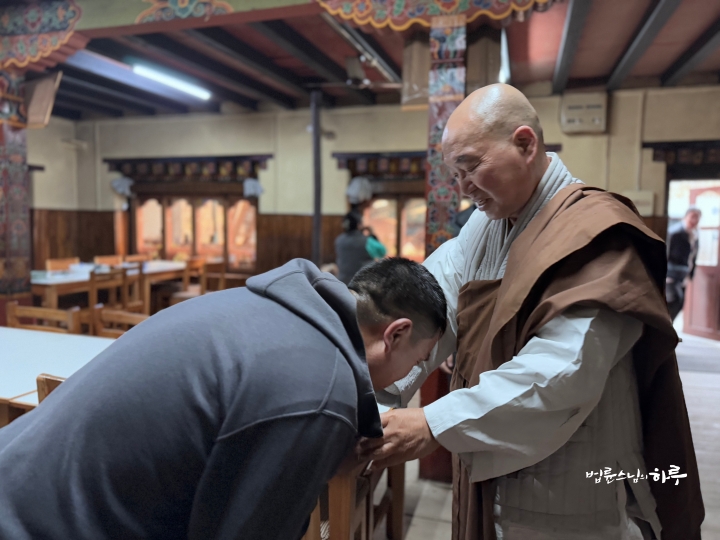Feb. 11, 2025 – Moving from Trongsa to Thimphu, Bhutan
Hello, it’s the 8th day of our Bhutan exploration. Today, we completed our survey of Trongsa Dzongkhag and moved to Thimphu, the capital.

After completing his morning practice and meditation, Sunim proofread manuscripts and departed for Thimphu at 6 AM. After about an hour’s drive, he had breakfast with his companions at a restaurant. While waiting for the food to be prepared, he sat by the wood stove, sipping warm tea and chatting with his companions.
“When I was young, we had many stoves like this that burned firewood. So every winter, when I went to school, I would carry a piece of firewood with me. We would also pile our lunchboxes on top of the stove to warm them up.” (laughs)
After the meal, Sunim thanked the restaurant owner and presented him with a rosary from Bodhgaya and Korean seaweed as gifts.
We continued our journey towards Thimphu by car. Passing through Pele La, which is over 3,400 meters above sea level, we encountered a herd of yaks and admired the beautiful scenery adorned with frost flowers.

Rinchen, who was serving as our interpreter, expressed a strong desire to show us Pobjikha Valley near Pele La, so we decided to make a brief stop. We arrived at Pobjikha Village at 8:25 AM.
Pobjikha is a valley at an elevation of 2,900 meters, situated on the left side of the Black Mountains, which form the border of Jigme Singye Wangchuk National Park. This high-altitude wetland is famous not only for its beautiful mountain scenery but also for being a winter habitat for rare migratory birds.
Among these, Pobjikha is particularly renowned as a habitat for the Black-necked Crane. The Black-necked Crane, also designated as a natural monument and endangered species in Korea, is named for its black head and neck. They arrive in Pobjikha in late October and return to Tibet across the Himalayas in mid-February or March. According to locals, before departing, the Black-necked Cranes circle the Kangteng Gompa temple in Pobjikha three times as a gesture of reverence before returning to Tibet.
After fully experiencing the quiet and cozy scenery of Pobjikha, Sunim and his companions departed for Thimphu again at 10 AM.

As we reached Punakha, which is at a lower altitude, peach blossoms were already blooming red. We then climbed the mountain road again, crossing the Dochula Pass at an altitude of 3,000 meters.
In the car, Sunim discussed the issues of ongoing projects with the staff in charge of Bhutan operations and suggested various ways to ensure smooth progress.
At 1 PM, Sunim and his companions arrived in Thimphu. As soon as they arrived, Yeshi heard that her grandmother was unwell and headed straight home without even having lunch. Sunim gave Yeshi a rosary and a picture of Buddha from Bodhgaya to pass on to her grandmother.
Sunim and his companions stopped at a restaurant for lunch. While waiting for the food to be served, Sunim noticed a map of Bhutan on the restaurant’s inner wall and spent a long time discussing Bhutan’s geography with his companions. Sunim’s knowledge of Bhutan’s geography was so detailed that he even noticed discrepancies in the distances between cities marked on the map compared to actual distances.
After lunch, we arrived at the Bhutan Nuns Foundation at 1:40 PM. Sunim proofread manuscripts and attended to his work. To relieve the fatigue accumulated from the demanding schedule, he skipped dinner and retired early.
Tomorrow, meetings are scheduled with Bhutan’s Cabinet Secretary and the Queen Mother.
As there was no Dharma talk today, we’ll conclude by sharing a conversation between a questioner and Sunim from last Friday’s Dharma Q&A.
Can I Really Trust My Husband Who Is Repenting After Domestic Violence?
“If you think you’ll live with your husband if he changes and you can’t live with him if he doesn’t change, then ultimately, the decision-making power for your life isn’t with you, but with your husband. It might seem like you’re making the decision, but the decision-making power is actually with your husband. Whether you live with him or not should be your decision. Why are you giving the decision-making power to your husband? So, you should decide either to live with your husband regardless of whether he changes or not, or decide not to live with your husband regardless of whether he changes or not. That’s how you should make your decision.
Deciding based on the other person’s behavior might seem like you’re making the decision, but in reality, since it depends on how the other person acts, the decision-making power is with the other person. How the other person acts is their business, and you should make your own decision about what you’re going to do. So now, there’s no need to say things like ‘In the past, I lived with my in-laws for 13 years.’
At that time, most people who got married lived with their in-laws, and during that time, they would marry off their sisters-in-law and brothers-in-law. That was just how life was. From today’s perspective, it might seem difficult, but back then, it was considered a person’s duty. Therefore, it’s neither desirable nor helpful in solving the problem to keep bringing up old issues and criticizing them from today’s perspective.
It’s also wrong for you to think that your husband should be grateful for what you did in the past. Because your husband considers it natural. From your husband’s perspective, he thinks it’s natural for a daughter-in-law to take care of her in-laws, so you shouldn’t expect him to be grateful or acknowledge your hard work. Less than one in ten men would do that. It’s your foolishness, not your husband’s fault, to choose such a person and then keep expecting him to be that one in ten men. Your expectations for your husband are too high.
There’s no need to talk about past stories anymore. If you keep hating your husband because you keep thinking about how you suffered in the past, that’s not your husband’s fault, but because the wounds you got in the past haven’t healed. In modern terms, this is called trauma. Trauma is a wound in the mind. It can be considered a kind of mental illness. If you have these symptoms, you should go to the hospital for treatment. Ruminating on it won’t solve the problem.
It’s actually more helpful for healing to understand that your husband might think differently from you. From your husband’s and in-laws’ perspective, they think it’s a duty that should naturally be fulfilled when you get married. We actually lived in an era when people thought that way. Saying it’s wrong from today’s perspective is like saying people from the Joseon Dynasty 500 years ago were wrong from today’s perspective. It doesn’t help at all in solving the problem at hand. It’s already in the past. So there’s no need to bring up such stories anymore. However, since you were hurt at that time, you should go to the hospital for treatment.
And your husband hitting you, regardless of the reason, is ethically wrong and legally wrong. This is legally considered a violent crime. So reporting it was the right thing to do. Whatever the reason, if someone uses violence, they should be punished. This is your right guaranteed by the Constitution of the Republic of Korea, so there’s no reason to feel sorry about it at all.
If your husband says he’s reflecting and promises never to do it again, you should think about it and if you judge ‘People don’t change their habits easily. Won’t he do it again if we live together?’, then you can use that as a reason for divorce. If you think ‘It’s awkward to live alone at this age, and it’s also awkward to live with another man, and it’s not good for the children to see’, then you shouldn’t expect your husband to change. Since your husband is at least saying he’ll change, you can just pretend to give in and say, ‘Okay, be careful from now on. If you do it one more time, I’ll divorce you.’ Just scare him a little and live together. But don’t actually expect him to change. Because people don’t change that easily. Neither I nor others, people don’t change easily.
Still, isn’t it better to hear him begging and saying he did wrong than to hear him boasting that he did the right thing? So, don’t believe his words, but since he’s at least saying that, you have an excuse to live together. If you think it’s better not to live together, you can use the violence as a reason for divorce, and if you think it’s better to live together, you can use his admission of wrongdoing as a reason to live together. If you need to, you live together, and if you don’t need to, you don’t live together. If you make a decision believing his words, you’ll be disappointed again when it doesn’t turn out that way. So you should think about what would be good for you and make a decision.
Regarding the house title, no matter how much your husband claims, if it’s in your name, it’s your property. No matter how much your husband claims it’s his, it’s just words. So when he talks like that, you can just say ‘Okay, I got it’ and move on. Due to the real name property ownership system, if the house is in your name, your husband can’t legally take it away. Because it’s in your name, if you sell it tomorrow, that’s the end of it.
However, if you get divorced, you’ll have to divide the property. If your husband has a lot of property in his name, you might get to keep the house and even get some more of your husband’s property. But if your husband has no property, even if the house is in your name, you’ll have to split it 50-50 when you divorce. This is not because your husband bought the house, but because that’s how the divorce procedure works. Also, if your husband has property in his name that’s worth more than the house, even if he claims it’s his, the house will become your property. So you don’t need to worry about that no matter what your husband claims. This is a right guaranteed by law, so when your husband talks like that, you can just say ‘Okay, I got it’ and move on. But don’t even jokingly say ‘Okay, the house is yours.’ Because if you say that, you’ll have to take responsibility for your words. Just say ‘I got it’ without arguing about whose it is. Because if you argue unnecessarily, if you say it’s yours, your husband will get upset and want to fight more, and if you say it’s his, later he might cause trouble saying ‘Didn’t you say it was mine back then?’ Don’t talk about whose it is at all, just say ‘Okay, I got it’ and don’t say anything more. If you do that, you don’t need to worry about the ownership of the house at all. Now, from your perspective, does your husband have any other property in his name besides the house, or none at all?”
“He has more.”
“If he has more, you don’t need to worry at all. If your husband tries to take your property, he should sell all his property in advance, give it to others or hide it somewhere, and then come for a divorce. If he does that and has no property left, you’ll have to split your property 50-50, but if that’s not the case, you don’t need to worry. While alive, you can dispose of property in your name as you wish. However, after death, it will be divided among your spouse or descendants as prescribed by law. And if you get divorced, you’ll have to divide the property you have. Therefore, if your husband has more property than the house, you don’t need to worry at all. You might even get more than the house. So don’t worry about what your husband says about the house.
Given this situation, would it be better to just divorce your husband? Or would it be better to use his apology as an excuse to live together? You decide.”
“My feelings haven’t changed. I’m fine with being together, and I’m fine without my husband.”
“Then you have nothing more to worry about. If your husband says let’s divorce, then divorce. If he says let’s live together, then live together. If he leaves you alone, just leave it be. If you don’t want to decide, just do what your husband says. If your husband says let’s not divorce, then say ‘Okay, be careful from now on’ and just live. If your husband says let’s divorce, then say ‘Okay, let’s divorce’.”
“Yes, I feel no emotional turmoil.”
“If you feel no turmoil, why is this even a question? It shouldn’t be an issue at all.”
“My husband says he’ll try to change, and I’m wondering if I should believe him.”
“You shouldn’t believe those words. If you’ve been deceived all this time and still believe him, you’re a fool. Also, even if you don’t believe your husband’s words, don’t say ‘I can’t believe you’ outwardly.”
“I understand.”
“Your husband admitting his mistakes gives you an excuse to stay together. If he still insisted he did nothing wrong, you’d feel bad and find it difficult to live together. But since he’s apologizing sincerely, you can say ‘Okay, I’ll give you one more chance. Be careful next time’ and use it as a reason to stay together. Just don’t actually believe that he’ll change.”
“I understand.”
“Because if you believe it, you’ll be disappointed again. You should live in a way that you won’t be hurt by your husband again.”
“Yes, that’s right.”
“So, adopt the attitude of ‘Whatever you do, it’s up to you.’ At least he’s apologizing, so you have an excuse to stay together. Even if you don’t believe your husband, say ‘I’ll give you another chance, so be careful from now on.’ But inwardly, don’t believe that he’ll actually change.”
“Thank you. After hearing your answer, all my concerns have been resolved.”





